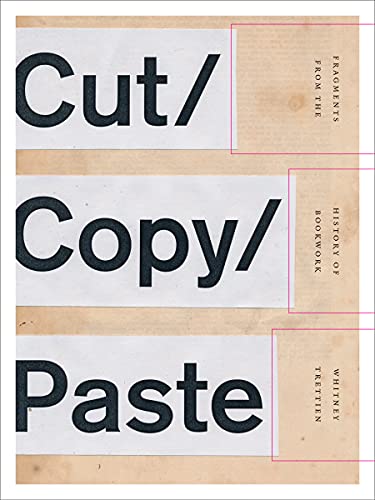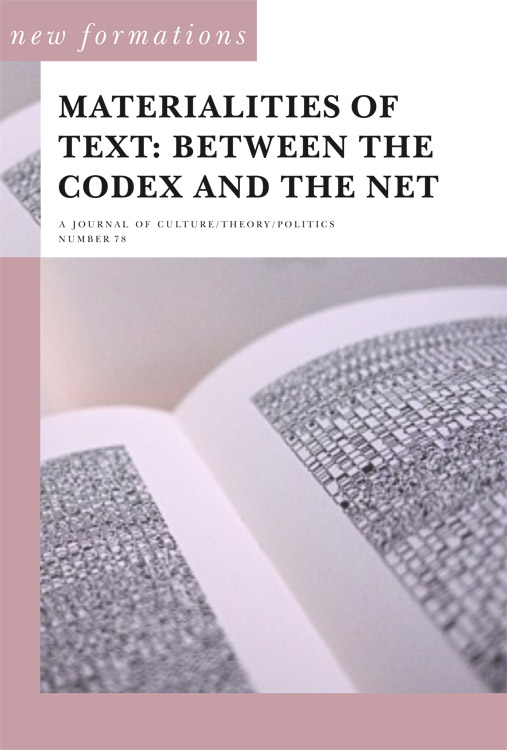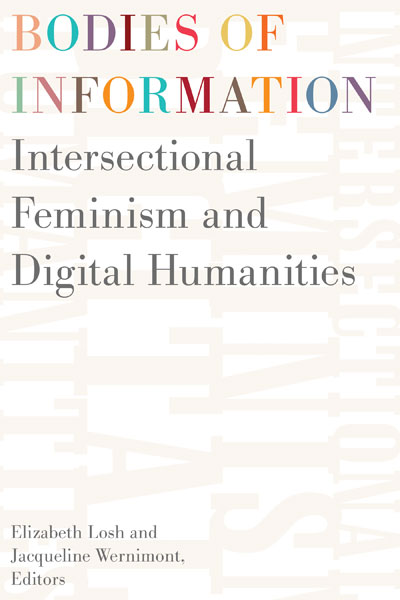Whitney Trettien: Cut/Copy/Paste: Fragments from the History of Bookwork (2021)
Filed under book | Tags: · book, copy, feminism, history, materiality, media, print, publishing, women

“In Cut/Copy/Paste, Whitney Trettien journeys to the fringes of the London print trade to uncover makerspaces and collaboratories where paper media were cut up and reassembled into radical, bespoke publications. Bringing these long-forgotten objects back to life through hand-curated digital resources, Trettien shows how early experimental book hacks speak to the contemporary conditions of digital scholarship and publishing. As a mixed-media artifact itself, Cut/Copy/Paste enacts for readers what Trettien argues: that digital forms have the potential to decenter patriarchal histories of print.
From the religious household of Little Gidding—whose biblical concordances and manuscripts exemplify protofeminist media innovation—to the queer poetic assemblages of Edward Benlowes and the fragment albums of former shoemaker John Bagford, Cut/Copy/Paste demonstrates history’s relevance to our understanding of current media. Tracing the lives and afterlives of amateur “bookwork,” Trettien creates a method for identifying and comprehending hybrid objects that resist familiar bibliographic and literary categories. In the process, she bears witness to the deep history of radical publishing with fragments and found materials.
With many of Cut/Copy/Paste’s digital resources left open for additions and revisions, this book reimagines our ideas of publication while fostering a spirit of generosity and inclusivity.”
Publisher University of Minnesota Press, Dec 2021
Creative Commons BY-NC-ND 4.0 International License
ISBN 9781517904098, 1517904099
328 pages
HTML (Manifold)
Comment (0)New Formations, 78: Materialities of Text: Between the Codex and the Net (2013)
Filed under journal | Tags: · archive, artists book, book, digital humanities, digital library, library, materiality, publishing, reading, shadow library, text

“The cultural authority of the codex form of the book appears to be in a process of displacement ensuing from the rise of on-line digital media. The traditional material structures of the book – its physical forms and its institutional forms of production, circulation, and preservation – are often seen as being subject to dematerialisation; evaporating in the transitory appearances of the digital screen and in the proliferation of new systems of production. However, this issue of New Formations makes the case that the present historical juncture should be understood as a mixed media milieu, in which traditional and digital forms of writing and publishing coalesce and conflict in a complex array of textual materialities.
Such materialities of text are at once sites of political and aesthetic experimentation, and of intense capitalization, intersecting features which are approached in the articles collected here through a broad range of theoretical and empirical themes: diagrammatic writing; the material reading formations of a best-seller novel; grey literature in the institutions of cultural studies; Black Twitter; the politics of Open Access and the artists’ book; digital humanities and its political problematics; the bibliopolitics of the passport; and the political and aesthetic forms of independent publishing.”
Contributions by Richard Burt, Sanjay Sharma, Hanna Kuusela, Johanna Drucker, Ted Striphas and Mark Hayward, Sas Mays, Janneke Adema and Gary Hall, Jodi Dean, Sean Dockray, Alessandro Ludovico, Pauline van Mourik, Broekman, Nicholas Thoburn and Dmitry Vilensky.
Edited and with an Introduction by Sas Mays and Nicholas Thoburn
Publisher Lawrence & Wishart, Summer 2013
ISSN 0950-2378
207 pages
Review: Janneke Adema (2013).
Comment (0)Elizabeth Losh, Jacqueline Wernimont (eds.): Bodies of Information: Intersectional Feminism and Digital Humanities (2018)
Filed under book | Tags: · affect, body, digital humanities, feminism, intersectionality, labour, materiality, new materialism, ubiquitous computing

“In recent years, the digital humanities has been shaken by important debates about inclusivity and scope—but what change will these conversations ultimately bring about? Can the digital humanities complicate the basic assumptions of tech culture, or will this body of scholarship and practices simply reinforce preexisting biases? Bodies of Information addresses this question by assembling a varied group of voices, showcasing feminist contributions to a panoply of topics, including ubiquitous computing, game studies, new materialisms, and cultural phenomena like hashtag activism, hacktivism, and campaigns against online misogyny.”
Contributors: Babalola Titilola Aiyegbusi, Moya Bailey, Bridget Blodgett, Barbara Bordalejo, Jason Boyd, Christina Boyles, Susan Brown, Lisa Brundage, micha cárdenas, Marcia Chatelain, Danielle Cole, Beth Coleman, T. L. Cowan, Constance Crompton, Amy E. Earhart, Nickoal Eichmann-Kalwara, Julia Flanders, Sandra Gabriele, Brian Getnick, Karen Gregory, Alison Hedley, Kathryn Holland, James Howe, Jeana Jorgensen, Alexandra Juhasz, Dorothy Kim, Kimberly Knight, Lorraine Janzen Kooistra, Sharon M. Leon, Izetta Autumn Mobley, Padmini Ray Murray, Veronica Paredes, Roopika Risam, Bonnie Ruberg, Laila Shereen Sakr, Anastasia Salter, Michelle Schwartz, Emily Sherwood, Deb Verhoeven, Scott B. Weingart.
Publisher University of Minnesota Press, 2018
Debates in the Digital Humanities series, 4
Open Access
ISBN 9781517906108, 1517906105
xxv+491 pages

